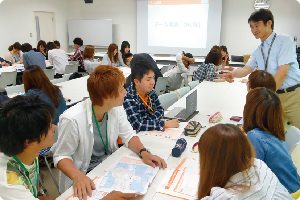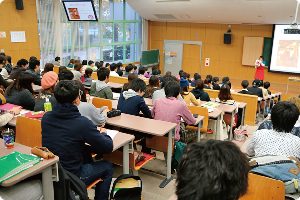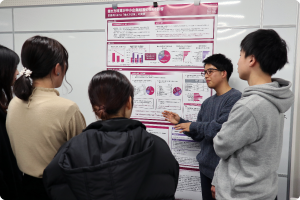Industrial Management
Cultivating Human Resources Equipped to Provide Stimuli to Industries & Regions
Students engage in the study of regional economies and the constituents comprising them, including businesses, residents, and municipalities, as well as the managerial resources—people, goods, money, and information—that provide the makeup of commercial enterprises. A range of projects are also implemented in collaboration with regional industries and businesses to foster students’ capacity to effectively manage such constituents in real-world settings.
These curricula serve to cultivate human resources equipped to cooperatively engage in providing stimuli to businesses and organizations, and innovative approaches to business projects.
Industrial Management Course
 In this era of progressive globalization, regional communities and the local economies that support them are increasingly linked with the world. Accordingly, such regions are undergoing considerable transformations. Meanwhile, having had its local economy markedly weakened by the rapidly declining birthrate and aging of the population, Ehime Prefecture is faced with an ever-more-varied range of issues.
In this era of progressive globalization, regional communities and the local economies that support them are increasingly linked with the world. Accordingly, such regions are undergoing considerable transformations. Meanwhile, having had its local economy markedly weakened by the rapidly declining birthrate and aging of the population, Ehime Prefecture is faced with an ever-more-varied range of issues.
Course curriculum focuses on regional industries, economies, and information, providing students with knowledge and skills to be applied as they venture out into the field for hands-on practice to equip themselves with practical management skills relevant to resolving issues in regional industries.
Business Creation Course
 In many regional industries, including those in Ehime Prefecture, the business growth of companies is being dampened by factors such as business operators’ declining numbers and labor shortages. In addition to this, even if they are to create new businesses in response to the changing environment, many regional companies still lack the human resources or organizational abilities required to put these projects on track.
In many regional industries, including those in Ehime Prefecture, the business growth of companies is being dampened by factors such as business operators’ declining numbers and labor shortages. In addition to this, even if they are to create new businesses in response to the changing environment, many regional companies still lack the human resources or organizational abilities required to put these projects on track.
Pursuing curriculum focused on management, accounting, and finance, students cooperate with regional stakeholders to cultivate practical abilities as well, and thereby equip themselves with knowledge and practical skills relevant to the conception and creation of new businesses.
Major Research Themes

- Considering survival strategies for famous regional confections
- Text mining-based analysis of Dōgo accommodations reviews and proposals for improving customer satisfaction
- The true role fulfilled by geoparks: Region-fostered “regional value”
- Regional stimulus strategies in Ehime Prefecture aimed at “regional revitalization” from the perspective of depopulation
- The use of visual marketing as a method of regional revitalization
- The potential of attracting businesses to regional cities using satellite offices
- The future of automobile insurance from the perspectives of automatic driving technology and sharing services
- Recent issues facing the traditional Japanese confectionery industry and future prospects
- Usage and implementation of Python by human resources from the humanities
- Analysis of freemium smartphone game consumer payment behavior using insight analytics
- Regional revitalization brought about by sports events: Considering Ehime Prefecture’s current state and visions for the future
- Considering the generation of lively activity in the IMABARI GINZA shopping arcade
- Research on money priming effects using final-offer games

